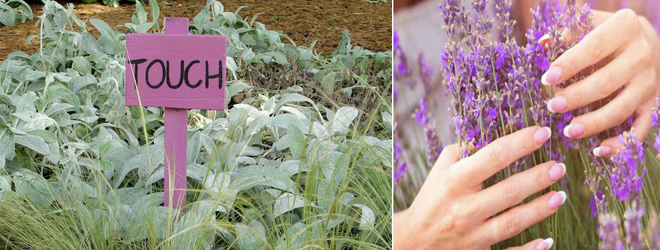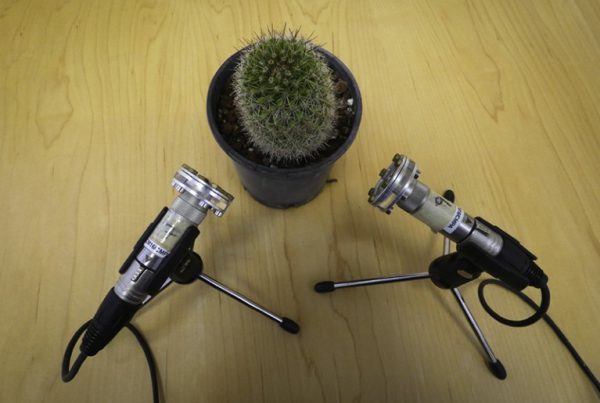
Sensory gardens are creating opportunities for relaxation and mindfulness, some experts say.
Occupational Therapy experts at Chatham University in Pittsburgh say summer is an opportune time to create stress-reducing sensory gardens.
Sensory gardens are outdoor spaces that create opportunities for folks to interact with nature by using some or all of the five senses: sight, scent, sound, touch, and taste. Like meditation, yoga and other relaxation techniques, sensory gardens can help augment the effects of mindfulness.
At Chatham University’s Eden Hall campus, occupational therapy students created a sensory garden.
“The sensory garden are Eden Hall is a pilot project to determine how we can improve quality of life for our students here at the campus and potentially for our community members,” said Janet Bucey, assistant professor at Chatham.
While Chatham’s focus is on its college students, the university said anyone can make a sensory garden.
“The key is to ask yourself questions about your particular sensory needs, so you can be intentional about which senses you want to activate: what sights, scents, sounds, touches, and tastes do you find calming, and which ones help you recharge?” said Theresa Delbert, doctoral capstone coordinator and assistant professor at Chatham University’s School of Health Sciences. “With these goals in mind, you can include specific plants and physical features to create an interactive multi-sensory experience that will help you relax, refocus, and re-energize.”
For a multi-sensory experience, consider the following:
SIGHT
Consider optimizing a sensory garden with flowers, trees, birds, and other shapes, colors and motions.
- What colors make you calm or happy?
- Do you rest and recharge better in sunlight or shadow?
- Are there animals you enjoy watching? If so, consider incorporating a feeder, bath, or other attractor into your sensory garden, so you can observe their sights and sounds.
SCENT
Consider planting herbs, blossoms, grass, and other scented plants and flowers.
- Oregano and thyme offer a hearty aroma that stimulates energy and alertness
- Lavender can help calm anxiety
- Mint provides a fresh and rejuvenating scent
SOUND
Consider adding elements that attract birds. Perhaps add in a wind or water element, such as bells, chimes and others.
- What sounds do you want to hear, and what sounds do you want to block out?
- Mobile items such as pinwheels can be both visually and auditorily stimulating
- If you find the sound of running water soothing, consider incorporating a fountain
TOUCH
Consider the warmth of the sunlight, the coolness of shade, the breeze on your skin, and different textures in the garden.
- Consider adding plants whose leaves, petals, and bark have a variety of textures
- Avoid plastics or metals when possible, and prioritize wood, stone, and fabric instead
- Do certain sensations calm or energize you? For example, would your sensory garden benefit from a rocking chair, fan, weighted blanket, warm sunlight, etc.?
TASTE
Consider incorporating elements that are physically and emotionally satisfying, like edible plants.
- Do certain tastes remind you of happy memories?
- Does the aroma or taste of a cup of coffee, tea, or other beverages differ outdoors, or in a space that is intentionally designed to offer fewer visual distractions?
- Growing tomatoes, peppers, cucumbers, carrots, etc., can provide both tactile and flavorful sensory stimulation.
While a sensory garden is easiest to create within an existing backyard or other green space, urban dwellers can also incorporate the principles of sensory gardens into community spaces, wooded areas, or porch, patio or other personal space. What really matters isn’t where a sensory garden is located, but how it is interacted with.
“There is a difference between spending time in a place and actively engaging with a place,” said Bucey. “Sensory gardens offer people an opportunity to intentionally engage their full range of senses in ways they may not usually experience, which can have a profound effect on their mood, attitude, and energy levels. Having seen its positive effects on our Occupational Therapy students, in the future we would like to explore the influence of Chatham’s sensory garden on other groups who commonly experience great anxiety or stress, such as Alzheimer’s and dementia patients.”
Studies show nature-based therapies can positively impact veterans with post-traumatic stress disorder.
One study published in Health Psychology Open featured eight Danish veterans who participated in a 10-week nature-based therapy. The results indicated the veterans acquired coping skills and tools to use in stressful situations, which showed an overall improvement in post-traumatic stress disorder symptoms.
Sensory opportunities aren’t a new concept for people with special needs. Many schools and children centers create sensory rooms for children. The University of Alabama in Huntsville created a sensory garden for special needs students in its Early Learning Center, and the little gardeners are loving it, according to the center’s director Deana Aumalis.
However, not much research has been conducted on how sensory gardens affect college students, according to Kasey Stepansky, academic fieldwork coordinator and assistant professor.
“That’s where we were kind of interested in what effects this therapeutic space would have on the campus environment and campus students,” Stepansky said.
Megan Jones, a student in the occupational therapy master’s program, said as a student she gets stressed out, and the sensory garden has been helpful in alleviating some of that.
“To be able to go out there, even if it’s just to sit down and enjoy the environmental and take in everything you’re experiencing, is a really relaxing feeling,” Jones said. “I think it’s just a really good tool for students to utilize.”
Source: Need a relaxing escape? Sensory gardens could be a therapeutic option.












